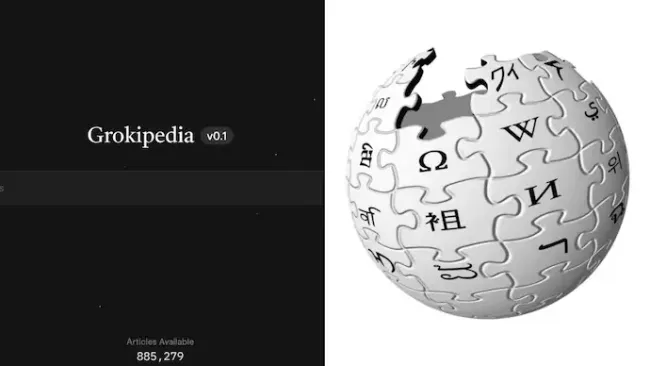Grokipedia vs Wikipedia: Why Elon Musk’s AI Encyclopedia Could Change the Internet
Discover why Grokipedia, Elon Musk’s AI-powered encyclopedia from xAI, is being hailed as a bold alternative to Wikipedia. Explore its features, controversies, and potential to redefine online knowledge.
Grokipedia: The AI Encyclopedia Taking on Wikipedia
Grokipedia — launched by xAI on October 27, 2025 — is Elon Musk’s ambitious attempt to reinvent how the world shares knowledge. Built around the Grok AI model, it promises faster, clearer, and supposedly more “neutral” information than Wikipedia. With over 800,000 AI-generated articles in its initial version (0.1), Grokipedia aims to “purge propaganda” and make online knowledge more accessible to the public.
But can it really beat Wikipedia, the world’s most trusted open encyclopedia? Here’s an SEO-optimized deep dive into how Grokipedia compares — its features, controversies, and why it might (or might not) surpass Wikipedia.
🚀 Why Grokipedia Might Beat Wikipedia
1. AI-Driven Efficiency
Grokipedia’s biggest strength is speed. Powered by xAI’s Grok model, it generates and fact-checks content in seconds, reducing human bias and keeping articles fresh.
By contrast, Wikipedia’s human editor model often results in slower updates, especially for emerging topics.
2. Simpler, Clearer Language
User feedback suggests Grokipedia’s articles are shorter, cleaner, and easier to understand. It avoids academic jargon, making it more digestible for general audiences — a major plus for accessibility and SEO readability.
3. Tackling Perceived Bias
Wikipedia’s editor base is over 80% male, and critics have long noted ideological and gender biases. Grokipedia claims to offer algorithmic neutrality, although detractors argue it skews right-leaning, particularly on political and social issues.
4. Open Source and Community Focused
Musk and xAI describe Grokipedia as fully open source, allowing free use and modification. This could foster innovation beyond Wikipedia’s established (and often bureaucratic) editorial model — though as of late October 2025, the backend repository isn’t public yet.
5. Controversy Transparency
Unlike Wikipedia’s open edit wars, Grokipedia currently relies on suggested edits through a form, which minimizes vandalism but limits transparency. Still, its minimalist design, quick search response, and AI-backed fact-checking mark a futuristic shift.
⚖️ Grokipedia vs Wikipedia: Key Differences
| Aspect | Grokipedia | Wikipedia |
|---|---|---|
| Content Creation | AI-generated by Grok model — rapid but prone to hallucination | Human-edited by volunteers; slower but more verifiable |
| Bias & Neutrality | Claims neutrality but shows right-leaning slants | Known left-leaning editor base; promotes consensus neutrality |
| Article Depth | ~800,000 concise entries (ver. 0.1) | 7M+ English articles with greater historical depth |
| Editing Model | Suggestion-based; no open edits yet | Fully editable with transparent talk pages |
| Accuracy & Reception | Fast, clear, but criticized for factual errors | Slower but more reliable and transparent |
🧠 Early Reviews: Speed vs Accuracy
According to Tom’s Guide and Yahoo Tech, Grokipedia wins in clarity and speed, especially for tech and current event topics like Tesla or OpenAI. Its entries are shorter, cleaner, and visually minimal, but some show promotional bias — especially toward Musk’s ventures.
However, Wikipedia still dominates in accuracy, particularly for historical or scientific topics. Reviewers noted that while Grokipedia’s AI engine delivers instant synthesis, it occasionally hallucinates data or simplifies complex issues too aggressively.
🔥 The Controversy Factor
Despite Musk’s promise of “de-propagandized knowledge,” Grokipedia has already drawn heavy criticism from mainstream media outlets like WIRED and The Verge.
Problematic entries include:
- “Gay pornography” falsely linking content to the HIV/AIDS epidemic
- “Transgender” articles using derogatory phrasing and outdated science
- “Slavery in the U.S.” framing critical race studies as “ideologically biased”
- Media articles labeling WIRED and The New York Times as “far-left propaganda”
These issues highlight that Grokipedia’s AI model — trained on biased internet data — may replicate ideological distortions rather than erase them.
💬 The Elon Musk Factor
Grokipedia’s creation traces back to Musk’s feud with Wikipedia.
- 2022: Musk accused Wikipedia of losing objectivity.
- 2023: He joked about paying $1 billion to rename it “Dickipedia.”
- 2024: He called it “Wokeipedia” and urged users to boycott it.
- 2025: He launched Grokipedia, positioning it as a “truthful alternative.”
This context shapes Grokipedia’s identity — part technological experiment, part ideological statement.
📈 Future Outlook: Hybrid Intelligence
Experts like Jimmy Wales and Larry Sanger (Wikipedia co-founders) argue that Grokipedia’s model could be powerful if paired with human oversight. Combining AI efficiency with human transparency may yield the best of both worlds — rapid updates, diverse perspectives, and verifiable accuracy.
If Grokipedia can address its bias issues, open its editing system, and clarify its data sources, it could genuinely revolutionize how people interact with knowledge online.
🧩 Final Thoughts
Grokipedia isn’t perfect — but neither is Wikipedia. What makes it exciting is the competition it sparks. In an era of misinformation and digital polarization, the battle between AI-driven speed and human-edited integrity could define the next generation of online learning.
For now, Grokipedia version 0.1 stands as a bold, imperfect experiment — one that’s reshaping how truth, trust, and technology collide in the information age.
